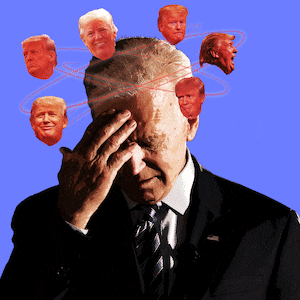Anyone who’s been on the internet for more than five minutes is probably familiar with a meme about the ease with which people who are born white and male sometimes coast through life convinced that their upward mobility is solely a function of their hard work and intrinsic abilities, even when neither are impressive, blissfully oblivious to their mediocrity and assuming that everything will go their way because it always has.
If this meme were a gubernatorial campaign, it would be Terry McAuliffe, who just ran for governor in Virginia—a position he’s held before, and in a state that Joe Biden won by 10 points—and lost despite a raft of advantages. He was a known quantity to Virginia voters, his opponent Glenn Youngkin ran an unimpressive bumbling campaign himself, and McAuliffe did not embrace any far-reaching progressive policies, which are often regarded as risky to candidates in states that aren’t solidly blue. He was a “safe” centrist with what political consultants call “high name ID,” which means you don’t have to explain who he is to the average voter—a challenge for any first time candidate who isn’t a celebrity.
The overconfidence of the candidate himself was also embodied in the campaign and the way it was run. McAuliffe’s team seemed to believe they were running in 2018, campaigning as aggressively against Donald Trump as if he was still occupying the Oval Office. But Trumpism has been largely decoupled from Trump himself. Youngkin embraces some of its key elements but he is not Trump in temperament, presentation, or style—which some Republicans might prefer. Nonetheless, McAuliffe persisted in trying to define Youngkin as the local embodiment of Trump, which voters did not buy because Youngkin’s demeanor and personality are nothing like Trump’s and he had the sense to keep the ex-president from showing up in the state to campaign for him.
Worse, McAuliffe failed to articulate what he offered as a compelling alternative. As a candidate, he was a boring status-quo politician, a beige blob who couldn’t or wouldn’t offer voters a forward-looking vision for the future of Virginia that went much further than damage control measures to mitigate the fallout from the ongoing pandemic. Voters who are still suffering the effects of the pandemic want to see a way out of it, but that doesn’t mean that they only want a simple return to the McAuliffe era of 2014.
But white guy confidence is a lens through which prior accomplishments appear bigger and more impressive. McAuliffe may have been nostalgic for the McAuliffe years, but voters wanted something new.
There were problems with execution, too. The campaign was understaffed until September, which is also a symptom of overconfidence, and quite possibly incompetence. The campaign also underestimated the extent to which this race was not like prior races. McAuliffe tried to ignore Youngkin’s deployment of lies about critical race theory being taught in schools, in an effort to cater to centrist voters who are turned off by culture war issues. But the culture war is important. Youngkin’s campaign understood that and went to great lengths to weaponize racial resentment, carefully wrapping it in rhetoric about education.
McAuliffe did not help this situation when he bothered to comment. In a debate with Youngkin, he remarked, “I don’t think parents should be telling schools what to teach,” a statement that was interpreted as an absolutist declaration that parents should not be allowed to make decisions about their own children’s education. This is not what McAuliffe meant, but in the context of an already polarized discussion about whether an educational curriculum that correctly teaches students about America’s legacy of racism is somehow an indictment of America and its white citizens—and in the absence of an affirmative message from the Democrat—it was remarkably tone-deaf. And it was easily utilized by Youngkin’s campaign to imply that in McAuliffe’s Virginia, children would be indoctrinated by the government via public schools while parents would have no say.
That may have been a turning point for the campaign, and McAuliffe was disappointingly passive about countering it. The campaign failed to avail itself of resources that were available. It’s not unusual for candidates to “backload” staffing and resources until close to election day because voters might not remember messages they get earlier in the campaign cycle. But waiting too late is dangerous as well, and when it was clear that McAuliffe was floundering after the education gaffe, it should have been a warning sign that they needed more help. But it takes a degree of humility to admit that you’re not getting the job done by yourself and call in reinforcements.
Ultimately, many of McAuliffe’s weaknesses were made worse by tired assumptions Democrats keep making that are increasingly out of step with the electorate: that a boring candidate is a “safe” candidate; that they can avoid discussions of race and dismiss the culture war as superficial political theater, which it is not; and that what voters want now is more or less the same as what they wanted a couple of decades ago.
Democrats repeatedly ignore class resentments—for which education is a perpetual stage of battle—and this manifests in a large gap between college-educated and non-college educated voters, the latter of whom sometimes view education beyond high school as an elitist pursuit. They conflate non-college educated voters with “working-class” voters, even though it’s not always the case, and this can reinforce that sense of resentment.
All of these things were catalysts for McAuliffe’s loss on Tuesday, and they were functions of overconfidence—in the candidate, in the relevance of dynamics from prior races, and in the ability to defang opposition messaging by pretending it’s not there. McAuliffe’s boring-ness was regarded as an asset, his complacency a function of his confidence that his experience guaranteed him a win. Instead, he received a lesson in humility.
The subtext of the white guy confidence meme is that white men don’t walk through the world the way women and people of color do—which is to say, with constant pressure to over-perform. Their whiteness and maleness means that their competence isn’t litigated in the same way, and they don’t have a constant nagging sense that they need to do more and prepare more than others in order to succeed. They may believe that their past accomplishments are more significant than they are, and overestimate their ability to deliver results in the future.
Not all white guys, of course. But looking at Tuesday’s results, the portrait of unearned confidence looks familiar.



